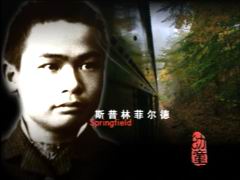Source: CCTV.com
08-14-2006 15:58

From 1891 on, the Chinese navy went into suspension. The advanced Chinese navy institution was like a magnificent palace standing in the desert.
In the early summer of 1894, the Warship Guangjia of the Guangdong Navy went north. The captain was Wu Jingrong who had studied at the Rensellaer Polytechnic Institute and the first mate was Song Wenhui, once at MIT. This was the only vessel in the Chinese navy in which the captain and the first mate were both returned boy students. Their mission was to deliver lychees to the emperor and empress dowager. Yet when their vessel arrived in Tianjin, the war broke out.
In 1894, a decisive battle of unprecedented tragedy and grandeur was staged between the two oriental countries equipped with western weapons, western tactics and western-trained officers. There were altogether over 10 commanding officers on both sides who had studied in the US or the UK.
We have documented some episodes of this naval war that determined the fate of China and Japan in modern history.
On 25th July 1894, in Fengdao sea battle, the first of the1894 marine war, Shen Shouchang, the first mate of the Jiyuan as well as a boy student, became the first person from the Chinese navy who died in the war. No pictures of him were left. He was from Shanghai, studied at Norwich School and died at the age 30.
Two months later, Huanghai naval war broke out. Twenty elite warships were sent by the Chinese and Japanese sides respectively. This was one of the most dramatic sea battles in the history of world marine wars.
The Chinese fleet was surrounded. Four Japanese vessels including The Yoshino {cornered} the flagship, The Dingyuan. Suddenly, a warship rocketed at full speed in front of The Dingyuan. It was the Zhiyuan captained by Deng Shichang. Deng graduated from Fujian Shipbuilding College. His first mate was Chen Jinkui, a boy student who studied at Philips Academy in Massachusetts being recalled by the Qing Government. Then he went to Europe with Deng Shichang to deliver four vessels back home. Deng Shichang trusted him very much.
Showered by the intense Japanese cannonfire, The Zhiyuan ran out of ammunition and was severely damaged, slowly sinking into the sea. Deng Shichang decided to crash into Yoshino, the Japanese flagship. Yet on its suicide mission, The Zhiyuan was hit by a torpedo which claimed all lives on board.
The war lasted into the start of the following year. The Japanese land and naval forces jointly defeated the Chinese land force and finally shattered the naval base of the Beiyang Navy at Weihai. The Beiyang Navy was completely destroyed in its first war.
February 21st 1895 was a tragic day in the history of the Beiyang Navy . The disarmed warship Kangji was permitted by Japanese forces to carry six coffins to Yantai from Weihai. Among the coffins were three high-ranking officers, namely Ding Ruchang, the governor general, who had committed suicide, Liu Buchan, captain of the Dingyuan and Lin Taizeng, captain of the Zhenyuan. Also among the dead were two boy students, Huang Zulian and Shen Shouchan.
After the 1894 war, Li Hongzhang signed the Treaty of Maguan, leaving China in deep trouble. Then followed the Hundred Days of Reform in 1898 and the Boxer Rebellion in 1900.
When the Eight-Nation Allied Army attacked Beijing, the Guangxu Emperor and Empress Dowager escaped to Xi’an. The Imperial government again relied on Li Hongzhang to deal with the situations. In 1901, Li Hongzhang unexpectedly died after he had signed a draft agreement of the Xinchou Treaty with more cruel terms than the Maguan Treaty. So ended the life of this legendary and controversial leader of foreign affairs in modern Chinese history.
Thirty years earlier, when Li Hongzhang and Zeng Guofan planned the unprecedented project of sending Chinese students abroad, they hoped that those young men would help strengthen China upon their return. However, those boy students came back to find a weakened nation on the brink of collapse.
What would become of these Chinese boy students educated} in the west, when China was plagued with disasters in the early years of the 20th century? No one knew if they would fade out of history forever with the demise of Li Hongzhang.
